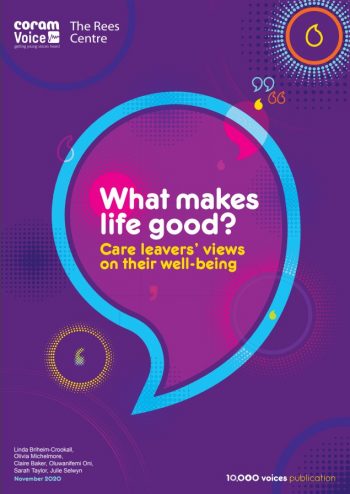New report highlights wellbeing inequality among care leavers

‘What makes life good? Care leavers’ views on their wellbeing’, published by Coram Voice in collaboration with Oxford University’s Rees Centre, has shown significant differences in the experience of care leavers between local authorities in England.
It found disparity in the percentage of care leavers with low wellbeing ranged from 14% to 44% by local authority. Similarly, in one authority, half of young people did not always feel safe in their home, in contrast to another local authority where the same was true for only one in five.
The report is the first of its kind in examining the wellbeing of care leavers from their perspective and enabling comparisons across local authorities by analysing 1,804 care leaver responses collected between 2017 and 2019.
Findings also showed that:
- Care leavers did worse than the general population on a range of measures.
- There was a steep decline in wellbeing after young people left care.
- Care leavers who reported that they had a disability or long-term health problem were particularly vulnerable.
- Overall, although a majority of care leavers had moderate to high wellbeing, 30% had low wellbeing. This analysis identified the ten key factors associated well-being.
- The care system can get it right. We can learn from the positive experiences of those with high wellbeing.
- Many young people were especially positive about the support they received from their leaving care personal advisers.
Report author Professor Julie Selwyn, of the Rees Centre at the University of Oxford, said: ‘Our analysis of the views of over 1,000 care leavers found that some, especially those with a disability or long-term health condition, had very low wellbeing. They had little support, felt unsafe in their own homes, were struggling financially and were pessimistic about their futures. Yet low wellbeing was not inevitable. Some care leavers were doing well and were proud of their achievements and ability to manage. Findings emphasise the large variation in care leavers’ wellbeing depending on where they live, but also show that with the right kind of support care leavers can do as well as anyone else.’
Brigid Robinson, Managing Director of Coram Voice, said: ‘Our report firmly puts the voices of young people leaving care centre stage by understanding, from their experiences, what makes life good. Our aspirations for young people leaving care should be the same as for our own children: that they thrive and grow to become confident young adults able to find their way in the world.
‘To achieve this, we need to understand what is important to them, what they love doing, their hopes and feelings, and what could make things better. “What makes life good?” does this and, through this unique insight into young care leavers’ subjective wellbeing, provides clear recommendations for policy and practice to make life better for young people leaving care so they can flourish into adulthood.’
The research highlights the importance of understanding how care leavers themselves feel about their lives. Understanding the factors that can improve care leavers’ wellbeing is essential to delivering high-quality services and support, instead of basing it purely on objective measures and professional assessments such as whether care leavers are in education and employment.
Key recommendations for local authorities, guided by factors that care leavers have identified, include:
- Improving connections, building trusting relationships and addressing loneliness.
- Providing emotional and mental health support to address stress, negativity and help care leavers feel good about their future.
- Providing money management and financial support to help care leavers cope financially.
- Improving accommodation support to help care leavers feel safe and settled in their homes.
- Identifying and supporting young people with disabilities and long-term health conditions.
- Levelling-up provision so that more young people get the positive experiences we see in the best areas.
- Addressing the cliff-edge of care at 18.
The report is part of a series of reports analysing the responses of 10,000 care leavers and children in care on what makes a positive difference to their wellbeing. This report follows a series of recent Children’s Commissioner’s reports and comes ahead of the government’s imminent review of children’s social care.
Read Professor Julie Selwyn’s blog post on prospects for young care leavers.
